Life on the Run (10 page)
Authors: Stan Eldon
Tags: #Running, #long distance, #cross-country, #athletics, #international races, #police, #constable, #half marathon, #Disability Sport, #autobiography, #memoirs, #biography, #life story

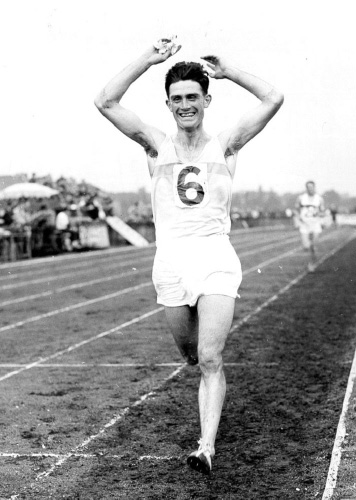
The British All-Comers' record run at five and six miles
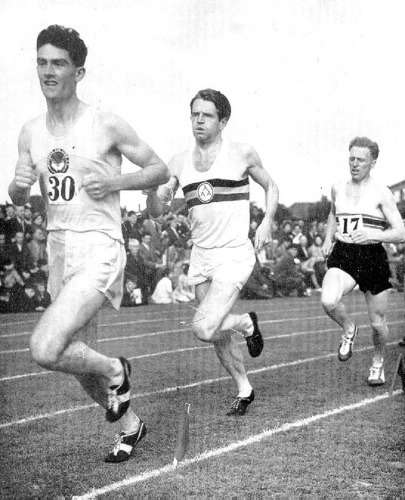
Young Eldon leads Chataway at Kodak Sports
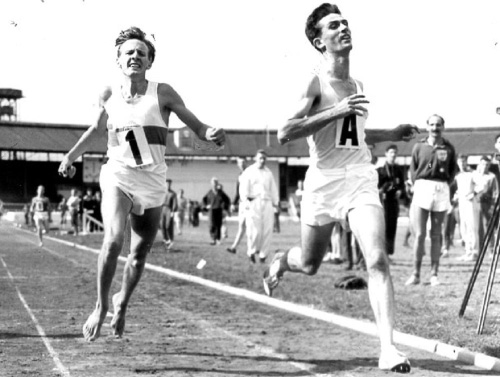
Some you win and some you lose, outsprinting Bruce Tulloh at London Fire Brigade Meeting, White City, August 1959 - both recording 8:50 for two miles
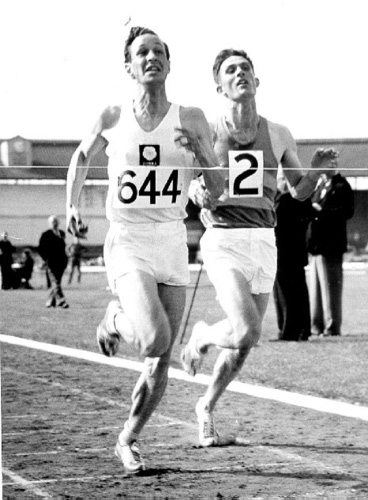
A narrow defeat by Steve James in Inter County three mile 1959 - both recording 13:36
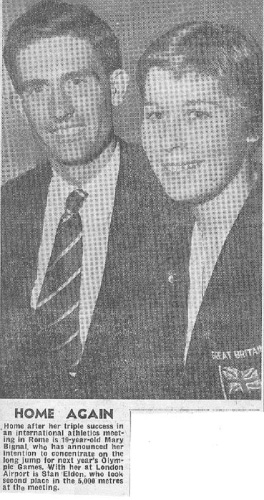
Return home from Rome with Mary Rand (Bignal). One of several photographs that got me into trouble at home!
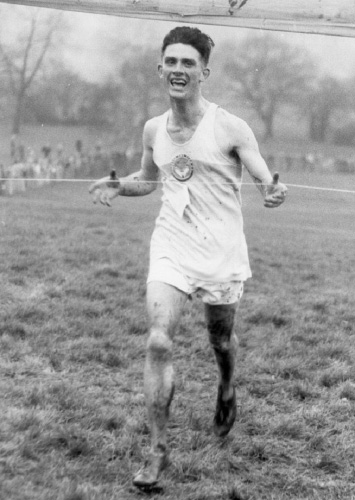
Winning the Southern Cross-Country at Parliament Hill a month before winning the International Title
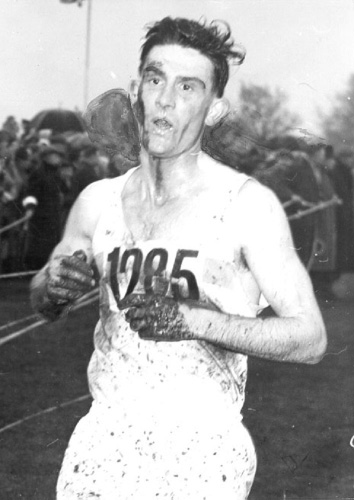
Finishing in third place at National Cross-Country at West Bromwich 1960
The week after the County Championships ended, with what was for me a poor performance, when I finished only sixth with a time of 14:18, running in a South v Midlands v North athletics match. My training race diary only says âPoor' so I do not know why I ran so badly, except looking at the time of day I trained that week, I could have been on night duty right up until the race. I kept up my training every day that I had started the previous October, and it was in the main producing the results I hoped for.
On June 28
th
1958, I ran in the AAA six miles championship at the Kinnaird Meeting at Chiswick. I knew I was going well, and in that race I proved it, as I broke Ken Norris's British record for the distance and on the way broke the five mile record as well. My new record for the six miles was 28:05, and the five mile record was 23:20. After the race Harold Abrahams, the former Olympic champion sprinter, later famed by the film Chariots of Fire, wrote to me and explained that if only I could run more even lap times, the world record could be mine. Harold continued taking an interest in me for the rest of my running career. I had a good win and a British record but it was a wasted opportunity, as I know I could have got much closer to Kuts' world figures, which were only twenty seconds faster. Perhaps the most flattering comments of my running career came after this race. The man who coached Roger Bannister to that first four minute mile, Franz Stampfl, could not believe I had to get back to Reading to work a 10 p.m. to 6 a.m. night shift. He was quoted as saying “A policeman? I can't think of a worse job for a world-class athlete. This Eldon must be fantastic to combine the two. He really ought to get another job. Slow striding on the policeman's beat is bad for him.” He then suggested that six months' training like Zatopek or Kuts and the world record could be mine.
This success brought me instant fame, and I was awarded the Ronson Sports Achievement Award of the Week. It was not a cheque for £5,000 which runners would probably get today, but a specially inscribed cigarette lighter. I still have this lighter, although it has never been used, and I can image what a modern athlete would say to such a presentation.
This race gave me a very unusual television experience. Peter Waterman, the British Featherweight Boxing Champion (brother of Dennis), was hosting a children's TV programme at the time, and he invited me on to talk about my record run. He picked me up from my home and we went to the studios for the live programme. After the usual make-up treatment and test for sound levels, I was sat on a sofa for the interview with Peter. The programme started OK and it then came to the point where he had to introduce and interview me. He completely dried up and left me sitting there. The producer then started frantically waving his arms, and from his gestures I could tell he wanted me to carry on by myself. They rolled the film of the race and I talked through it and it went all right apparently. It was an interesting programme, with the singer Lita Rosa and Nigel Lythgow the dancer.
Articles and cartoons appeared in newspapers, comics and magazines about the âgalloping policeman' and some were written by myself, including a section in a book that was produced by the then
News
Chronicle
. Six sportsmen of the day contributed. They were Billy Wright, Matt Busby, Jimmy Armfield, Colin Cowdrey, Eamonn Andrews and myself. The local newsagent was very good and would deliver to me any newspaper that had a mention of me. Sometimes this was quite a lot of newspapers, and just as well they were not as bulky as some of today's editions.
My new celebrity status brought with it some extra activities, including opening a casino in Windsor, crowning beauty queens at local carnivals and opening church and village fetes. I also had to make my first after-dinner speech at a dinner for the newsagents from the Windsor, Slough area. Proposing the toast to the association was Air Vice Marshal âPathfinder' Bennett, and I had to reply on behalf of the guests.
I did not play football after about the age of twelve years, but in the 1960s I turned out for a Celebrity team in a charity match at Windsor, replacing Peter Osgood the Chelsea player who had a broken leg at the time. I think the team would have done better with him.
Television was still the coming media in the 1950s, but athletics was always on BBC radio with commentators like Max Robertson and Harold Abrahams. I had my share of interviews on the radio, and I also got to appear on television quite a few times. There was a little money beginning to creep in and I received about £10 an interview.
Between the Commonwealth and European Championships, I went to Portsmouth with Martin Hyman and Percy Cerutty (Herb Elliott's coach), to do a television programme comparing us with greyhounds.
On the 1
st
July, I was running in an invitation 1.5 mile (6 lap) race at Paddington. This had been well publicised as a race between this new star, me, and the established favorite Gordon Pirie, who held the unofficial world's and British best time for the distance. In the changing room before the race he told me how he would beat me at this event and I did not stand a chance. The race started and I ran in my usual way at the front; first lap in 63.6, 880 yards in 2:8, 3/4 mile in 3:13.6, mile in 4:20.6 and 5:28 at the bell. Pirie followed until the last lap, and on the back straight he made his move and went past me. He gained a few yards but I responded and held him round the bend, and as we came off the bend into the final straight I pounced, remembering that he said I could not outsprint him, and I went for the line winning by a few yards in 6:27.6. A second outside his best for the distance but that was of no consequence. I had won in grand style and won a suitcase as a reward. The third placed runner was Eric Shirley with Tony Redrup (Wycombe Phoenix Harriers), my frequent rival over ten miles, fourth.
The next day I was in Devon running at the cricket ground in Torquay. This was the annual Devon Police Sports which always attracted large crowds; something around 5,000/6,000 was the normal attendance. It was a handicap meeting and I ran two races. The first was the mile, where I ran off 25 yards, but I was the back marker and finished fourth in 4:11.2. Then it was the three mile, and here I was off scratch, and ahead of me at the start with a lap handicap advantage was the local hero and a very good runner, Dennis Crook. I chased him hard around the grass track, but I was running twelve laps to his eleven, and it just proved too much, so I took second place in 13.55.
During the busy years of 1958 to 1960, I was always on the move with races every few days in all sorts of places, and much of the travelling was done between my police shifts, working nights, travelling next morning, running in the evening and then travelling back and starting work again on the next evening or even earlier. I could be running up to six races a week in far-flung places and over many different distances. Wherever I was, I could nearly always get some assistance from the local police by way of a lift in a police car to catch a train or flight; even abroad; and I remember having a great deal of help when I was in Helsinki. The local police chief took me to their police museum and put a car at my disposal for my stay.